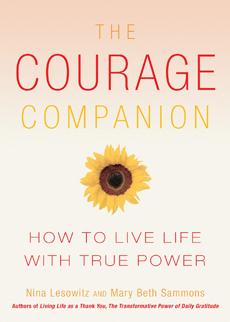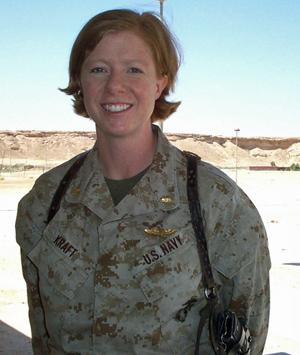Whether it is losing a loved one or a job, facing foreclosure or serious illness, people need courage to face what life throws in their path on a daily basis. To explore what courage is and how it can help people transform their lives, Nina Lesowitz and Mary Beth Sammons interviewed dozens of courageous people from all walks of life and across the globe.
They share their findings in their new book, "The Courage Companion."
Rising to the challenge
Sammons knows exactly how it feels when challenges in life arise unexpectedly and all at once.
"I was employed full-time as a vice president at a company and our company was sold," Sammons says. "So I lost the stability of the full-time job. I also lost my father. So it was a sad moment. I also have three children. All those things together, you have to just keep on going. So I feel like I had no choice but to find the courage to just get up and keep going and find something new."

Among the new things Sammons found was a job working for an inner city school in Chicago, Illinois. There, she says, she was inspired by a courageous African-American grandmother. For years, Lucille Jackson has been battling against the gangs and extreme violence in her community to provide hope for her 17-year-old grandson.
"She has lost everything," she says. "She has seen three of her children die of cancer or be killed in this dangerous neighborhood, yet she's determined that her grandson Michael will beat the odds and be the first person in the family that will graduate from high school."
'The Courage Companion'
Lucille Jackson is one of dozens of courageous people profiled in "The Courage Companion: How to Live Life with True Power," which Sammons co-authored with her friend Nina Lesowitz.
The book also includes the story of Romel Joseph, the blind Haitian violinist who captured worldwide attention after last year's earthquake destroyed his music school in Port-au-Prince.
"He was trapped inside for 17 hours," Sammons explains. "His wife actually died. She was trapped in the building as well, and she did not get out. He kept himself alive by singing the music he loves so much in his head, playing it over and over. When he got out, he was injured and went to a hospital. He's back in Haiti, trying to rebuild his school."
Some people were profiled in "The Courage Companion" for their fight against injustice despite threats, harassment and violence, in places like South Africa, Nepal and Iran.
Reacting to tragedy
Others rise above their personal misfortune and help others. Amanda Coggin, a writer in San Francisco, California, is an example. When her boyfriend committed suicide a few years ago, she decided to do what she could to prevent similar tragedies.
"There have been some organizations that I've connected with," Coggin says. "The first one is Challenge Day. They are based here in California. They go into high schools and do day-long sessions with kids to get to the bottom of the bullying and teasing and issues that are happening with kids, whether it is high pressure schools or what's happening in kids' families. It was something I was naturally drawn to before I knew it would be my best suicide prevention work."
Helping others was also the best way for Maddy Oden to help herself. When her daughter died after being given a drug to induce labor, Oden began speaking out against the risks of medical intervention and the use of certain drugs during childbirth.
"Something inside me said this is not going to happen to anyone else," Oden recalls. "I proceeded to do what I do, which is form a non-profit organization that's educational for pregnant women to empower them around the issues of childbirth and pregnancy."
Facing fear

In "The Courage Companion", we also meet with Lt. Heidi Kraft, who served as a clinical psychologist in the US Navy. She told Mary Beth Sammons that courage is not as the lack of fear, but rather the ability to face it. When Kraft was deployed to Iraq in 2004, her twin son and daughter were only 15 months old.
"There was an actual, real possibility that I'd never see their second birthday," Kraft says. "And, as a mother, I sort of panicked. I almost remember feeling frozen, with fear. I had to put that away. I had to take my feelings as a mother and just move them to a place I couldn't touch and focus on being a provider and an officer, a friend, the roles that were required from me at that moment. I knew my patents needed me, I knew my people needed me."
Kraft wrote about her experience in a book titled, "Rule Number Two: Lessons I Learned in a Combat Hospital." She says dangerous situations are not all bad. They often transform one's life.
"I learned so much from our 19-, 20-, 21-year-olds that we ask to do much for our country and the loyalty they have for one another, for their mission, even in the face of injury and fear," she says. "It changed everything for me. I know for a fact that I grew, as a psychologist, as a mother, as an officer, as a wife, as a friend and as a woman. It's given me a perspective on what's important in almost every phase of my life."
Courage Companion co-author Sammons says the conclusion she and Nina Lesowitz came to after interviewing Kraft and so many others is that courage means different things in different situations. But, as she notes in her book, it remains the true power we need to live a full life, make a difference and pursue our dreams.
foreclosure: the act of foreclosing on money that has been borrowed 抵押品贖回權的取消
Face adversity with a smile 笑對逆境
(來源:VOA 編輯:崔旭燕)
